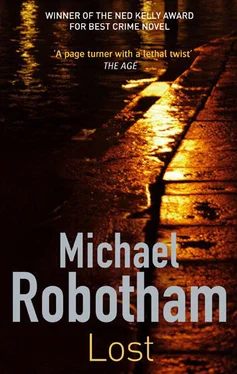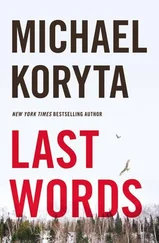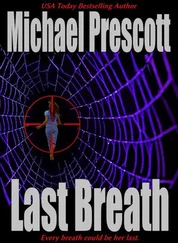Reaching into his pocket, Joe takes out a crumpled page of notes and smooths it on his thigh. “I've been thinking.”
“Good.”
“I want to forget about the kidnapping question and concentrate on the ransom demand. If you look at the letters there's no indication of psychological looseness or obsession. They asked for a huge ransom but it was a feasible amount for someone like Aleksei to pay or even Sir Douglas. Enough to be worth the risk.
“We know there were at least three people involved. Kirsten was the likely planner. Ray Murphy did the logistics. Intellectually Kirsten is above average. Everything about her typifies carefulness and preplanning. She must have experimented with the packages, getting the right dimensions. She was aware of tracking devices and forensic tests . . .”
The Professor is on a roll. I've seen him do this before—crawl inside someone's head until he knows what they know and feels what they feel. “The ransom plot was clever but overcomplicated. When people are faced with a complex problem they often only consider a certain number of options or scenarios. If there are too many unknowns, they get confused. That's why people plan up to a point or in sections. Sometimes they leave out the exit strategies because they don't consider failure as a possibility.
“Whoever conceived the plan worked everything out but they made it too complicated. Look at all the things that had to go right. The packaging of the ransom had to be perfect, the control of the courier, getting the diamonds to the storm-water drain, detonating the explosives, creating the flood . . . If any one of these things had gone wrong, the plan would have failed.”
“Maybe they tested the system first. The voice on the phone to Rachel said, ‘Let's do this one more time.'”
Joe nods slowly but isn't convinced. “This is the sort of operation you only mess up once. Given a second chance, you'd want to simplify things.”
He begins pacing, flourishing his hands. “Let's assume just for a moment that they did kidnap her. They took her underground, which is also how they chose to collect the ransom. They needed somewhere to hold her. Somewhere that Ray Murphy was most likely to have chosen.”
“Not in the sewers—it's too dangerous.”
“And taking her above ground meant risking recognition. Her photograph was everywhere.”
“You think they held her underground?”
“It's worth considering.”
There's someone I can ask—Weatherman Pete. I look at my watch. I'll call him in a few hours.
“What about Gerry Brandt?” asks Joe.
“He had a passport in the name of Peter Brannigan as well as a driver's license. It costs a lot of money to get a new identity and to disappear—even to a place like Thailand. You need connections.”
“You thinking drugs?”
“Maybe. According to international directory inquiries there's a beach bar called Brannigan's in Phuket.”
“Fancy that. What's the time in Thailand?”
“Time to wake them up.”
Rachel has fallen asleep on the sofa in the waiting room. I gently shake her awake. “Come on, I'll take you home.”
“But what about Mickey?”
“We'll find her. First you need to sleep. Where do you want to go?”
“Dolphin Mansions.”
“Take my car,” says Joe. “I've called a cab.”
He's still on the phone to Phuket talking to a waitress who doesn't understand English, trying to get a description of Peter Brannigan.
Outside the streets are empty except for a council sweeping machine with twirling brushes and jets of water. I open the car door and Rachel slips inside. The interior smells of pine air freshener and ancient tobacco.
Using a borrowed overcoat as a blanket, she covers her knees. I know she has questions. She wants reassurance. Maybe we're both deluding ourselves.
Headlights sweep across the interior of the car as we drive toward Maida Vale. She rests her head against the seat, watching me.
“Do you have children, Inspector?”
“I'm not a policeman anymore. Please call me Vincent.”
She waits for an answer.
“Twins. They're grown up now.”
“Do you see much of them?”
“No.”
“Why?”
“It's a long story.”
“How long can it be? They're your children.”
I'm caught now. No matter what I say to her she won't understand. She desperately wants to find her child and I don't even talk to mine. Where's the fairness in that?
She tucks her hair behind her ears. “Do you know that sometimes I think I made Mickey frightened of the world.”
“Why do you say that?”
“I kept telling her to be careful.”
“All parents do that.”
“Yes, but it wasn't just the normal stuff like not patting stray dogs or talking to strangers. I made her frightened of what can happen if you love something too much and it disappoints you or gets taken away. She wasn't always scared to go outside. It only started when she was about four.”
“What happened?”
In a forlorn voice she describes a Saturday afternoon at a local park, where she and Mickey would often go to feed the ducks. This one particular Saturday there was an old-fashioned fair, with a steam-powered carousel, cotton candy and whirligigs. Mickey rode all by herself on a gaily painted horse, proud of the fact that she didn't need her mother to sit behind her. When the ride finished, she was on the far side of the carousel. Rachel had been drawn into conversation with a woman from her mothers' group and didn't notice the ride ending.
Mickey stepped off. Instead of circling, she wandered through the forest of legs thinking that surely one of the hands belonged to her mother.
She walked back toward the pond where the ducks had gathered in the skirts of a willow tree. Peering over the low railing fence she watched two boys, no older than eleven, throwing stones. The ducks huddled together. Mickey wondered why they didn't fly away. Then she noticed the ducklings, sheltering beneath a feathered breast and muddy tail feathers.
One duckling—a dark ball of down against the darkness of the shade—separated from the others. It took the full force of a stone and disappeared beneath the surface. Seconds later it reappeared, floating lifelessly on the green scum in that corner of the pond.
Mickey burst into hysterical wailing. Tears streamed down her cheeks into the wide corners of her mouth. Her crying made the boys drop their stones and edge away, not wanting to be blamed for whatever had made her cry.
The howls from the edge of the pond created a strange dichotomy of reactions. Some people almost fell over each other to ignore them. Others watched and waited for someone else to intervene.
The pigeon man was nearest. Grizzled and yellow-toothed, he raised himself up from his bench, brushing pigeons off his lap as though they were spilled crumbs. Shuffling across to Mickey, he hitched up his trousers so that he could kneel beside her.
“You got a problem, Missy?”
“Make them stop,” she wailed, with her hands clamped over her ears.
He didn't seem to hear her. “You want to feed the birds?”
“The ducks,” she sobbed.
“You want to feed the ducks?”
Mickey howled again and the pigeon man raised his eyebrows. He could never understand children. Taking her hand, he went in search of a park attendant or the girl's mother.
A policeman was already approaching. He pushed through the crowd and took in the scene. “I want you to let her go,” he demanded.
“I'm looking for her mother,” explained the pigeon man. Spittle clung to his tangled beard.
“Just let the girl go and step away.”
By then Rachel had arrived. She swept Mickey up, held her tightly, and the two of them tried to out-hug each other. Meanwhile, the pigeon man had his arms stretched wide on the back of a park bench, while the policeman patted him down and searched his pockets, spilling birdseed onto the grass.
Читать дальше












